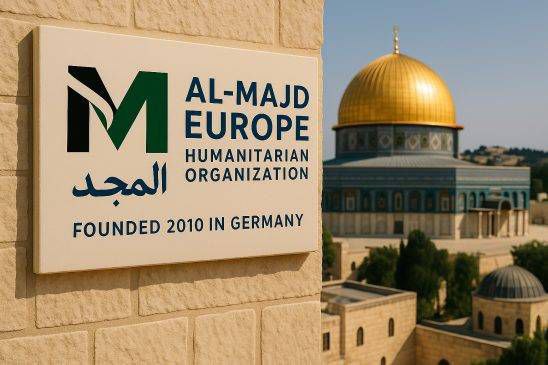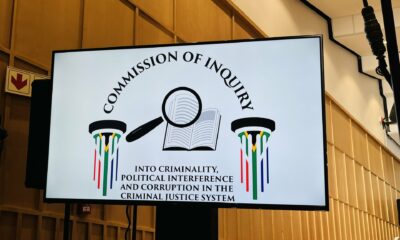News
Inside the Shadowy Rise of Al-Majd Europe: How a Mystery Group Is Moving Palestinians to South Africa

A Mystery Organisation, Two Flights and a Wave of Questions
South Africans have been following the unusual arrival of Palestinian travellers with growing curiosity and concern. What started as one unexpected landing at OR Tambo has suddenly grown into a full-scale investigation, with government officials, humanitarian groups and journalists all zeroing in on a name few had heard before this month: Al-Majd Europe.
The group is believed to have coordinated at least two flights involving Palestinians escaping Gaza. But as the dust settles, the bigger story isn’t the flights themselves it’s the organisation behind them.
President Cyril Ramaphosa has already hinted at the seriousness of the situation, saying the travellers appeared to have been “flushed out” of Gaza.
Gift of the Givers founder Dr Imtiaz Sooliman went even further, calling it “forced migration” and warning the movement resembled “ethnic cleansing.”
These aren’t small accusations and they’ve sparked a national debate. But who exactly is Al-Majd Europe, and why are experts now calling it suspicious?
Peeling Back the Layers: A Website That Tells Its Own Story
South Africans love a good digital sleuthing moment and in this case, online investigators had more than enough to work with.
The first red flag? The domain registration.
A website that looks legit… until you check what’s under the hood
Al-Majd Europe’s website uses HTTPS, so at first glance it appears secure. But the domain information is completely hidden even the registrant details are protected. That alone doesn’t prove wrongdoing, but when you combine it with donation requests? The picture starts to shift.
Automated trust-check tools give the domain a low trust score, and ScamAdviser describes it as “rather low.”
Then comes the kicker:
The website claims the organisation was founded in 2010 in Germany yet its domain is far newer, with no trace of its supposed decade-long history.
In other words, the digital footprint does not match the organisation’s story.
Where Is Al-Majd Europe Actually Registered? No One Can Prove It
The group insists it was formed in Germany, but investigative reporters from outlets like Haaretz, Al Jazeera and Palestine Chronicle found no evidence of a legitimate registration in that country.
Instead, some reports point to:
-
Estonia,
-
shadowy or partial registrations,
-
or no verified legal presence at all.
This lack of official paperwork is one of the biggest red flags. Humanitarian organisations typically have clear registration trails, transparency reports, verified addresses and public-facing leadership structures.
Al-Majd Europe, it seems has none.
A Pattern of Red Flags: Payments, Photos, and “Phantom” Offices
1. Thousands Paid Into Personal Bank Accounts
Multiple Palestinians told reporters they were charged between $1,500 and $6,000, in rand, that can reach over R100,000 to secure their evacuation flights.
But instead of paying into a proper NGO account, evacuees say they were told to send money to individual people via bank apps.
In the charity world, that’s one of the biggest red flags possible.
2. Donation pages that don’t work
Several users and journalists found that:
-
donation links were broken
-
payment buttons didn’t function
-
no receipts were issued
Legitimate humanitarian groups ensure these systems work flawlessly.
3. AI-generated or stock photos
This is where 2025 comes in.
Reporters noticed that images of staff and beneficiaries appeared to be AI or stock images a major credibility problem for an organisation claiming hands-on operations.
Most real NGOs proudly showcase authentic photos of their teams in branded gear, their relief sites, their field operations. In Al-Majd Europe’s case, an unbranded plaque featuring the Dome of the Rock which many mistake for Masjid Al-Aqsa is doing most of the heavy lifting.
That’s hardly proof of legitimacy.
4. A Jerusalem address that can’t be verified
The group claims its headquarters sit in Sheikh Jarrah, East Jerusalem a politically charged location and an iconic neighbourhood with deep cultural significance.
But reporters who attempted to confirm the address found:
-
no physical office
-
no signage
-
no trace of the organisation
Even the listed email address reportedly bounced back.
The South African Link: How Refugees Ended Up Here
South Africa has long positioned itself as a supporter of Palestinian rights, which is why the sudden influx of refugees has struck a deep emotional chord. Many locals feel torn wanting to help people fleeing war, while also questioning whether these refugees may have been financially exploited in the process.
Dr Sooliman said he believed more than 170 Palestinians arrived on an earlier flight, and President Ramaphosa publicly acknowledged that the nature of these arrivals was “unusual.”
Put bluntly, the pattern suggests forced migration, not voluntary relocation.
And now, with the new group of arrivals and more details surfacing about Al-Majd Europe, the suspicion has intensified.
South Africans React: Sympathy, Anger and Digital Detective Work
Online, the reaction has been explosive.
Many South Africans are expressing compassion for the displaced families, especially given the intense conditions in Gaza. Others are outraged that people fleeing a humanitarian crisis may have been taken advantage of by a dubious organisation.
A growing number of social media users are now doing their own digging, flagging inconsistencies in the website, resharing investigative threads and demanding government intervention.
For a country familiar with scams, fake NGOs and questionable fundraising campaigns, this story hits close to home.
Why This Matters: Beyond the Flights and Headlines
South Africa’s relationship with Palestine is historic, political and deeply emotional.
But this moment also highlights a newer challenge: the rise of digital-first humanitarian scams organisations that look like charities, sound like charities, but exist mostly as webpages, payment links and unverifiable claims.
As government agencies continue their investigation into Al-Majd Europe, one thing is clear:
Refugees fleeing conflict deserve protection, not exploitation.
And South Africans deserve to know who is operating in their name and whether these groups are helping or harming some of the world’s most vulnerable people.
{Source: IOL}
Follow Joburg ETC on Facebook, Twitter , TikTok and Instagram
For more News in Johannesburg, visit joburgetc.com



























